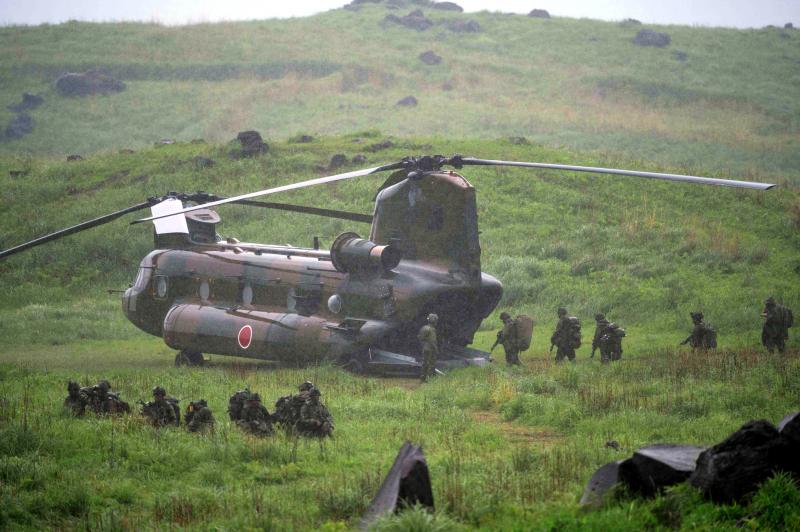Tokyo must boost its military at a “radically different pace” than in the past to counter Beijing’s growing capacity, Japan’s defense minister said in an interview published yesterday.
Japanese Minister of Defense Nobuo Kishi said that the gap between the Japanese military and the Chinese military was “growing by the year,” in an interview with the Nikkei daily.
“We must increase our defense capabilities at a radically different pace than in the past,” he said, citing China’s military spending as well as new areas of warfare such as space, cyber and electromagnetic warfare.

Photo: AFP
Japan’s defense spending has tended to hover at about one percent of GDP, but Kishi said that spending would be guided by needs rather than caps.
“The security environment surrounding Japan is changing rapidly with heightened uncertainty,” the Nikkei quoted him as saying. “We will properly allocate the funding we need to protect our nation.”
Japan’s post-war constitution limits the scope of its military to defensive power, and efforts to boost capacity have sometimes been controversial domestically.
Kishi’s comments come with Japan increasingly concerned about the regional security environment and particularly China’s growing assertiveness.
The military balance between Japan and China has “leaned heavily toward China in recent years, and the gap has been growing by the year,” he told the paper.
Kishi also said that Japan considers issues related to Taiwan “as our own problem,” as China increases pressure on Taipei.
Japan has been more vocal in the past few months about Chinese moves in regional waters, and particularly the presence of coastguard ships around disputed islands in the East China Sea.

Taiwanese actress Barbie Hsu (徐熙媛) has died of pneumonia at the age of 48 while on a trip to Japan, where she contracted influenza during the Lunar New Year holiday, her sister confirmed today through an agent. "Our whole family came to Japan for a trip, and my dearest and most kindhearted sister Barbie Hsu died of influenza-induced pneumonia and unfortunately left us," Hsu's sister and talk show hostess Dee Hsu (徐熙娣) said. "I was grateful to be her sister in this life and that we got to care for and spend time with each other. I will always be grateful to

UNITED: The premier said Trump’s tariff comments provided a great opportunity for the private and public sectors to come together to maintain the nation’s chip advantage The government is considering ways to assist the nation’s semiconductor industry or hosting collaborative projects with the private sector after US President Donald Trump threatened to impose a 100 percent tariff on chips exported to the US, Premier Cho Jung-tai (卓榮泰) said yesterday. Trump on Monday told Republican members of the US Congress about plans to impose sweeping tariffs on semiconductors, steel, aluminum, copper and pharmaceuticals “in the very near future.” “It’s time for the United States to return to the system that made us richer and more powerful than ever before,” Trump said at the Republican Issues Conference in Miami, Florida. “They

REMINDER: Of the 6.78 million doses of flu vaccine Taiwan purchased for this flu season, about 200,000 are still available, an official said, following Big S’ death As news broke of the death of Taiwanese actress and singer Barbie Hsu (徐熙媛), also known as Big S (大S), from severe flu complications, the Centers for Disease Control (CDC) and doctors yesterday urged people at high risk to get vaccinated and be alert to signs of severe illness. Hsu’s family yesterday confirmed that the actress died on a family holiday in Japan due to pneumonia during the Lunar New Year holiday. CDC Deputy Director-General Tseng Shu-hui (曾淑慧) told an impromptu news conference that hospital visits for flu-like illnesses from Jan. 19 to Jan. 25 reached 162,352 — the highest

TAIWAN DEFENSE: The initiative would involve integrating various systems in a fast-paced manner through the use of common software to obstruct a Chinese invasion The first tranche of the US Navy’s “Replicator” initiative aimed at obstructing a Chinese invasion of Taiwan would be ready by August, a US Naval Institute (USNI) News report on Tuesday said. The initiative is part of a larger defense strategy for Taiwan, and would involve launching thousands of uncrewed submarines, surface vessels and aerial vehicles around Taiwan to buy the nation and its partners time to assemble a response. The plan was first made public by the Washington Post in June last year, when it cited comments by US Indo-Pacific Commander Admiral Samuel Paparo on the sidelines of the Shangri-La Dialogue